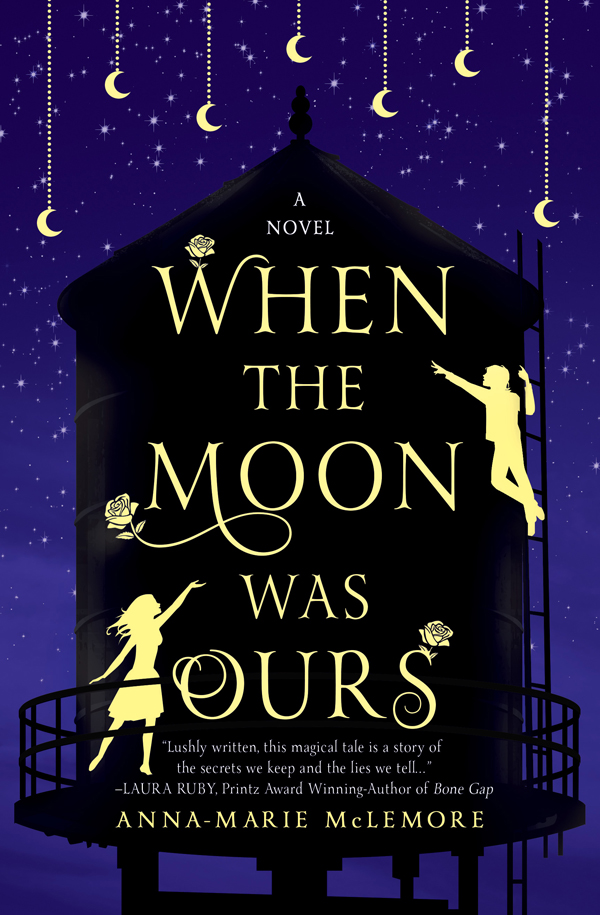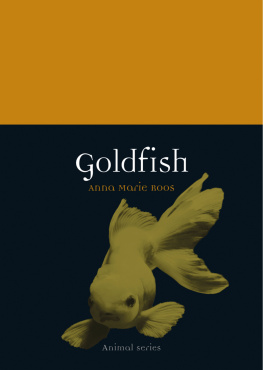Anna-Marie McLemore - When the Moon Was Ours
Here you can read online Anna-Marie McLemore - When the Moon Was Ours full text of the book (entire story) in english for free. Download pdf and epub, get meaning, cover and reviews about this ebook. year: 0, genre: Prose. Description of the work, (preface) as well as reviews are available. Best literature library LitArk.com created for fans of good reading and offers a wide selection of genres:
Romance novel
Science fiction
Adventure
Detective
Science
History
Home and family
Prose
Art
Politics
Computer
Non-fiction
Religion
Business
Children
Humor
Choose a favorite category and find really read worthwhile books. Enjoy immersion in the world of imagination, feel the emotions of the characters or learn something new for yourself, make an fascinating discovery.

- Book:When the Moon Was Ours
- Author:
- Genre:
- Year:0
- Rating:3 / 5
- Favourites:Add to favourites
- Your mark:
- 60
- 1
- 2
- 3
- 4
- 5
When the Moon Was Ours: summary, description and annotation
We offer to read an annotation, description, summary or preface (depends on what the author of the book "When the Moon Was Ours" wrote himself). If you haven't found the necessary information about the book — write in the comments, we will try to find it.
When the Moon Was Ours — read online for free the complete book (whole text) full work
Below is the text of the book, divided by pages. System saving the place of the last page read, allows you to conveniently read the book "When the Moon Was Ours" online for free, without having to search again every time where you left off. Put a bookmark, and you can go to the page where you finished reading at any time.
Font size:
Interval:
Bookmark:


The author and publisher have provided this e-book to you for your personal use only. You may not make this e-book publicly available in any way. Copyright infringement is against the law. If you believe the copy of this e-book you are reading infringes on the authors copyright, please notify the publisher at: us.macmillanusa.com/piracy.
To the boys who get called girls,
the girls who get called boys,
and those who live outside these words.
To those called names,
and those searching for names of their own.
To those who live on the edges,
and in the spaces in between.
I wish for you every light in the sky.
Maybe I need you the way that big moon needs that open sea.
Maybe I didnt even know I was here til I saw you holding me.
Andrea Gibson
While this book is very much a work of fiction, I wouldnt have felt safe writing a story that draws on so many aspects of my identity if it werent for many wonderful people I have the privilege of knowing and working with. Im tremendously thankful for all of them. Ill name a few here.
Taylor Martindale Kean, who I wanted to work with the first time we met, who Ive been grateful to work with ever since, and who is an incredible advocate for diversity in literature. Stefanie Von Borstel and Adriana Dominguez, for their help with my Spanish, and everyone at Full Circle Literary for creating a place where diverse authors and stories are welcome.
Kat Brzozowski, for her guidance and wisdom with this book, and for her energy, humor, and spirit. Lisa Pompilio, for another gorgeous cover that captures the spirit of two characters and their world. The team at Thomas Dunne Books/St. Martins Press: Tom Dunne, Michelle Cashman, Brittani Hilles, Marie Estrada, Karen Masnica, Brant Janeway, Lisa Davis, and Romanie Rout; Talia Sherer, Anne Speith, and Peter Janssen at Macmillan Library; and everyone else who turned this story into a book.
The writers who offered their insights: Mackenzi Lee, for the candor and the camaraderie across three thousand miles. Kelly Loy Gilbert, for her invaluable thoughts no matter what stage a manuscript is at. Aisha Saeed, for helping make this storys grounding more authentic and its magic more accessible. Shveta Thakrar, for her advice on helping these characters heritages shine through, and for being a sister in fairy tales.
Robin Talley, who through her books and her friendship makes me braver and a little less afraid to write queer characters.
Nadia Hashimi and Jenny Nordberg, whose work first introduced me to the cultural and societal context of bacha posh.
My mother, who taught me to be a hopeless romantic. My father, for raising me to believe there was nothing being a girl could stop me from doing. My family, who makes me proud of the people and places I come from.
My husband, for his grace and patience in all things and, in particular, with all my questions about his life as a transgender boy.
Readers, for giving books lives of their own.
As far as he knew, she had come from the water. But even about that, he couldnt be sure.
It didnt matter how many nights theyd met on the untilled land between their houses; the last farm didnt rotate its crops, and stripped the soil until nothing but wild grasses would grow. It didnt matter how many stories he and Miel had told each other when they could not sleep, him passing on his mothers fables of moon bears that aided lost travelers, Miel making up tales about his moon lamps falling in love with stars. Sam didnt know any more than anyone else about where shed come from before he found her in the brush field. She seemed to have been made of water one minute and the next, became a girl.
Someday, he and Miel would be nothing but a fairy tale. When they were gone from this town, no one would remember the exact brown of Miels eyes, or the way she spiced recado rojo with cloves, or even that Sam and his mother were Pakistani. At best, they would remember a dark-eyed girl, and a boy whose family had come from somewhere else. They would remember only that Miel and Sam had been called Honey and Moon, a girl and a boy woven into the folklore of this place.
This is the story that mothers would tell their children:
There was once a very old water tower. Rust had turned its metal such a deep orange that the whole tank looked like a pumpkin, an enormous copy of the fruit that grew in the fields where it cast its shadow. No one tended this water tower anymore, not since a few strikes from a summer of lightning storms left it leaning to one side as though it were tired and slouching. Years ago, they had filled it from the river, but now rust and minerals choked the pipes. When they opened the valve at the base of the tower, nothing more than a few drops trickled out. The bolts and sheeting looked weak enough that one autumn windstorm might crumble the whole thing.
So the town decided that they would build a new water tower, and that the old one would come down. But the only way to drain it would be to tip it over like a cup. They would have to be ready for the whole tower to crash to the ground, all that rusted metal, those thousands of gallons of dirty, rushing water spilling out over the land.
For the fall, they chose the side of the tower where a field of brush was so dry, a single spark would catch and light it all. All that water, they thought, might bring a little green. From that field, they dug up wildflowers, chicory and Indian paintbrush and larkspur, replanting them alongside the road, so they would not be drowned or smashed. They feared that if they were not kind to the beautiful things that grew wild, their own farms would wither and die.
Children ran through the brush fields, chasing away squirrels and young deer so that when the water tower came down, they would not be crushed. Among these children was a boy called Moon because he was always painting lunar seas and shadows onto glass and paper and anything he could make glow. Moon knew to keep his steps and his voice gentle, so he would not startle the rabbits, but would stir them to bound back toward their burrows.
When the animals and the wildflowers were gone from the brush field, the men of the town took their axes and hammers and mallets to the base of the water tower, until it fell like a tree. It arced toward the ground, its fall slow, as though it were leaning forward to touch its own shadow. When it hit, the rusted top broke off, and all that water rushed out.
For a minute the water, brown as a forgotten cup of tea, hid the brush that looked like pale wheat stubble. But when it slid and spread out over the field, flattening the brittle stalks, soaking into the dry ground, everyone watching made out the shape of a small body.
A girl huddled in the wet brush, her hair stuck to her face, her eyes wide and round as amber marbles. She had on a thin nightgown, which must have once been white, now stained cream by the water. But she covered herself with her arms, cowering like she was naked and looking at everyone like they were all baring their teeth.
At first a few of the mothers shrieked, wondering whose child had been left in the water towers path. But then they realized that they did not know this girl. She was not their daughter, or the daughter of any of the mothers in town.
No one would come near her. The ring of those who had come to see the tower taken down widened a little more the longer they watched her. Each minute they put a little more space between her and them, more afraid of this small girl than of so much falling water and rusted metal. And she stared at them, seeming to meet all their eyes at once, her look both vicious and frightened.
Font size:
Interval:
Bookmark:
Similar books «When the Moon Was Ours»
Look at similar books to When the Moon Was Ours. We have selected literature similar in name and meaning in the hope of providing readers with more options to find new, interesting, not yet read works.
Discussion, reviews of the book When the Moon Was Ours and just readers' own opinions. Leave your comments, write what you think about the work, its meaning or the main characters. Specify what exactly you liked and what you didn't like, and why you think so.






